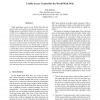Free Online Productivity Tools
i2Speak
i2Symbol
i2OCR
iTex2Img
iWeb2Print
iWeb2Shot
i2Type
iPdf2Split
iPdf2Merge
i2Bopomofo
i2Arabic
i2Style
i2Image
i2PDF
iLatex2Rtf
Sci2ools
104
Voted
ACSAC
2003
IEEE
2003
IEEE
Usable Access Control for the World Wide Web
While publishing content on the World Wide Web has moved within reach of the non-technical mainstream, controlling access to published content still requires expertise in Web server configuration, public-key certification, and a variety of access control mechanisms. Lack of such expertise can result in unnecessary exposure of content published by non-experts, or can force cautious non-experts to leave their content off-line. Recent research has focused on making access control systems more flexible and powerful, but not on making them easier to use. In this paper, we propose a usable access control systems for the World Wide Web, i.e., a system that is easy to use both for content providers (who want to protect their content from unauthorized access) and (authorized) content consumers (who want hassle-free access to such protected content). Our system can be constructed with judicious use of conventional building blocks, such as access control lists and public-key certificates. We...
Related Content
| Added | 04 Jul 2010 |
| Updated | 04 Jul 2010 |
| Type | Conference |
| Year | 2003 |
| Where | ACSAC |
| Authors | Dirk Balfanz |
Comments (0)

